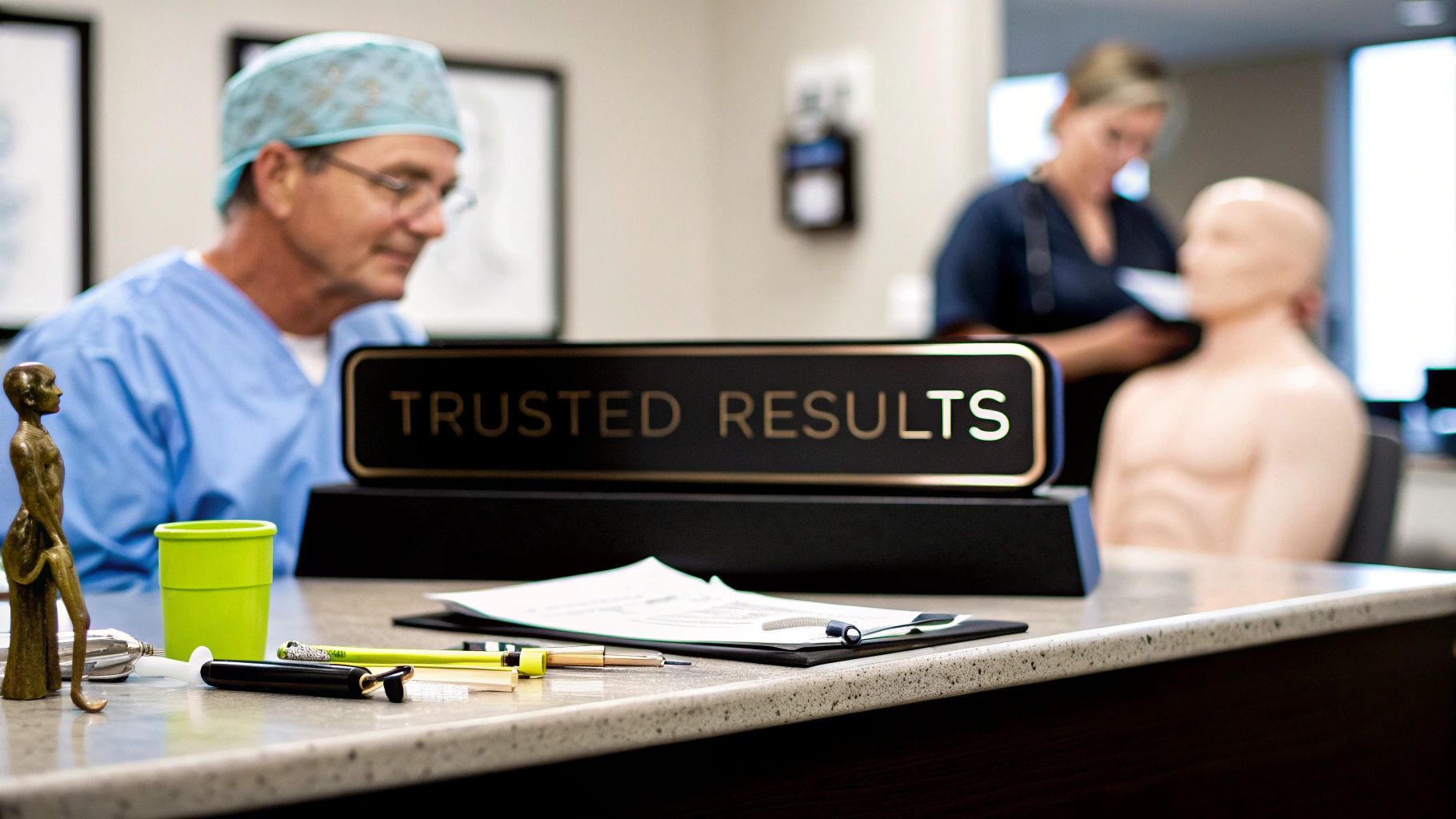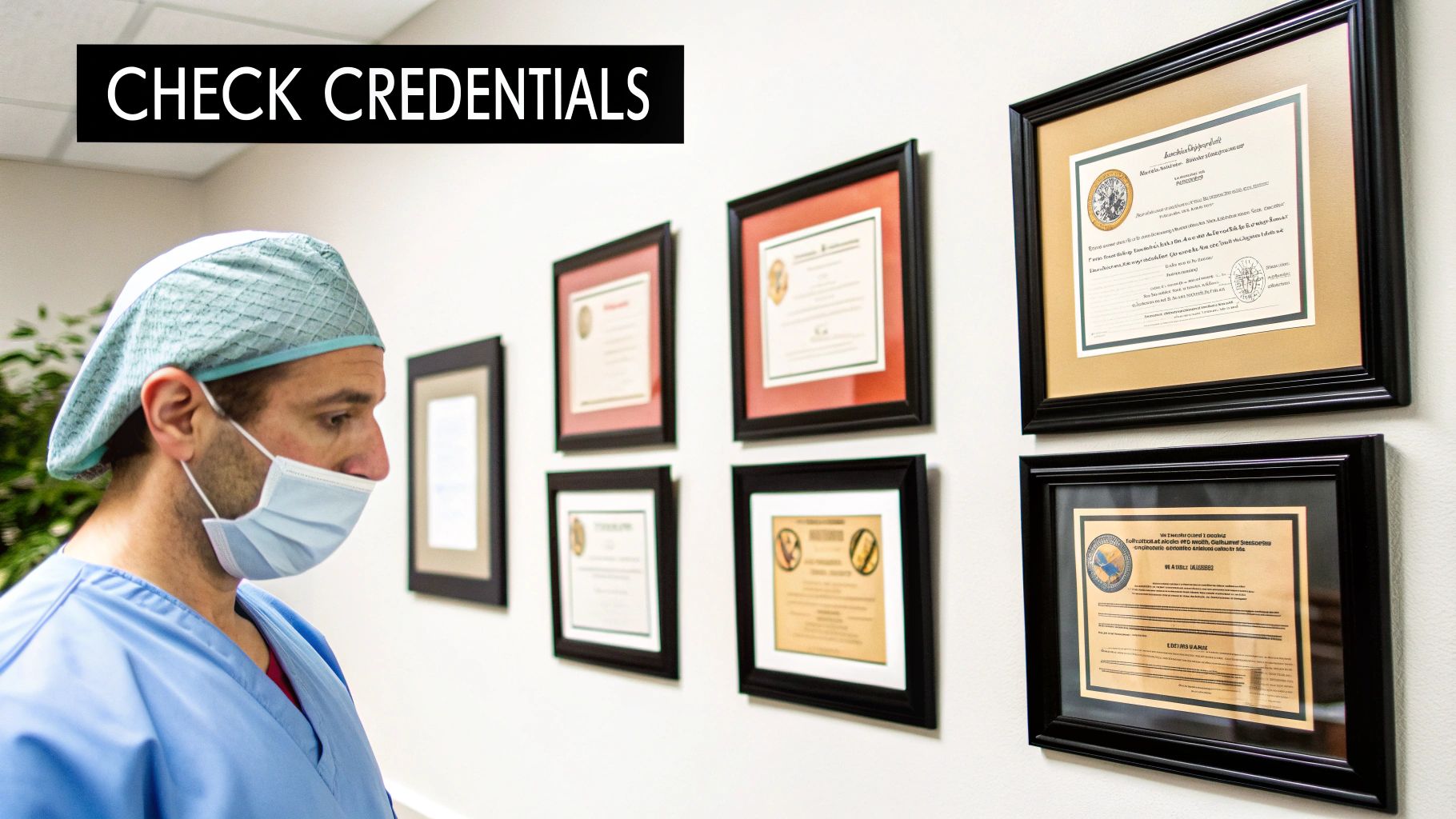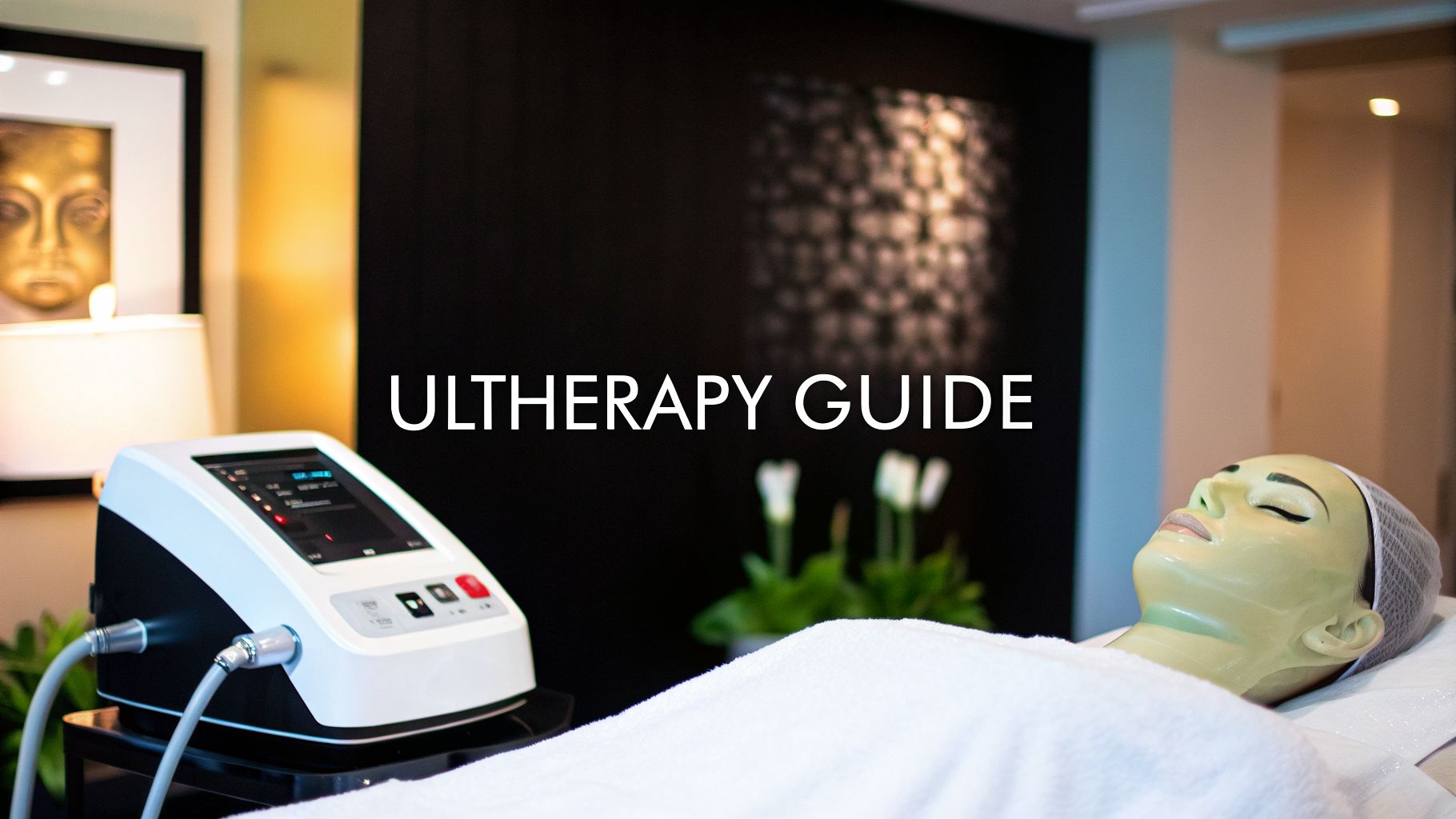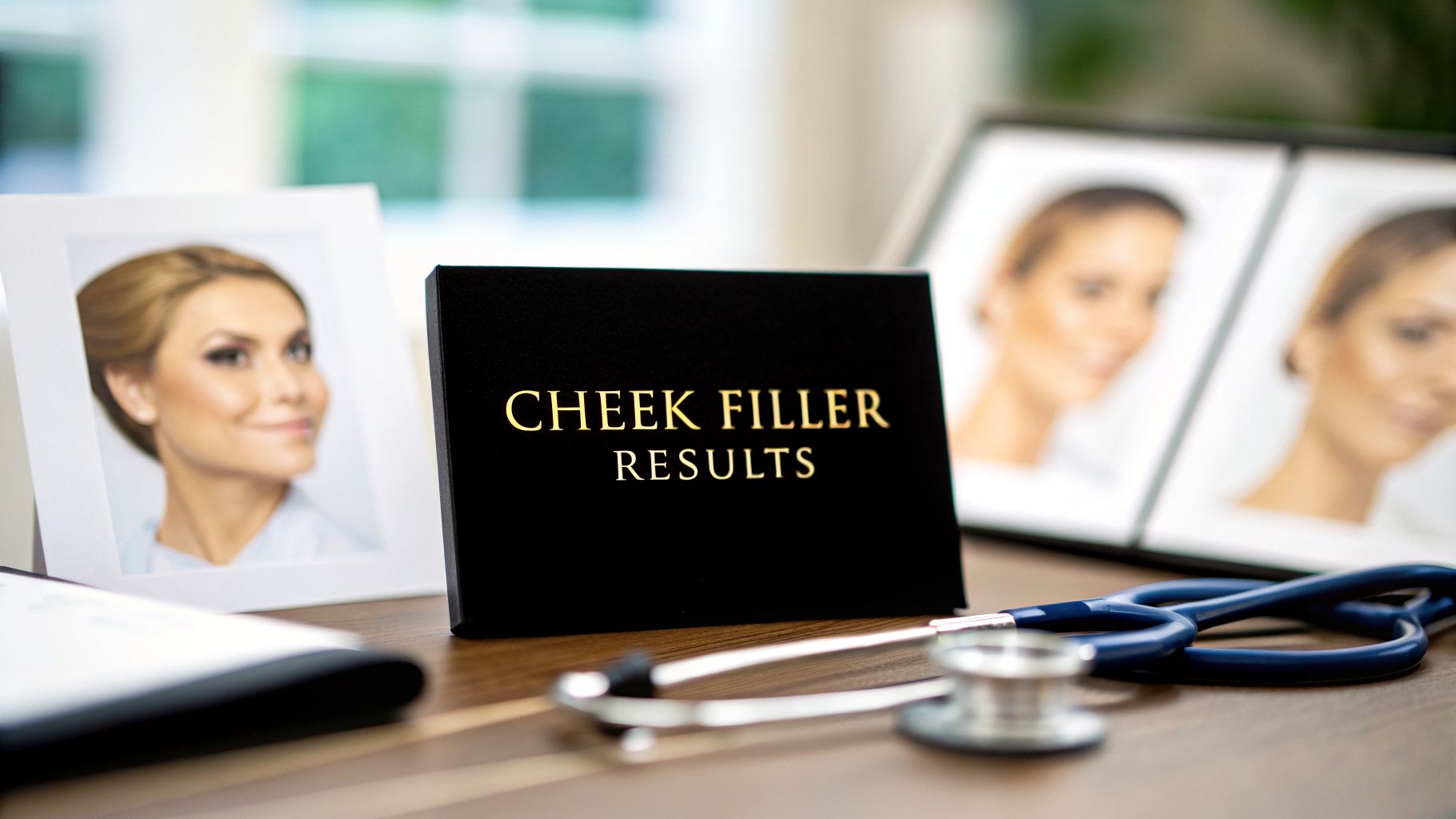
February 21, 2026
How to Prevent Keloid Scars After Surgery A Definitive Guide
Discover how to prevent keloid scars after surgery with our definitive guide. Learn expert strategies for risk assessment, surgery, and post-op scar care.
Sep 8, 2025

Choosing a plastic surgeon is a huge decision. It really comes down to verifying their credentials, making sure they’re board-certified, and confirming they have deep experience in the specific procedure you want. Honestly, this homework is the single most important thing you can do for your safety and for getting the results you’re hoping for.

Before you fall in love with a surgeon’s before-and-after photos, you need to check their qualifications. This isn’t just ticking a box; it’s the bedrock of a safe and successful experience.
The most important credential to look for is board certification from the American Board of Plastic Surgery (ABPS).
Think of ABPS certification as the gold standard. It means a surgeon has gone through at least six to eight years of demanding surgical training, with a minimum of three years focused solely on plastic surgery. On top of that, they have to pass tough written and oral exams to prove they know their stuff.
Here’s something many people don’t realize: any licensed doctor can legally perform cosmetic procedures. That doesn't mean they should. A surgeon who is board-certified in another specialty, like dermatology or general surgery, simply doesn't have the same specialized training as an ABPS-certified plastic surgeon. It's a critical distinction for your safety.
A surgeon’s commitment to board certification speaks volumes. It shows their dedication to patient safety, ethical practices, and the highest standards of care. It should be a non-negotiable part of your checklist.
Luckily, verifying this is easy. You can hop on the ABPS website and use their "Find a Surgeon" tool to check a doctor's certification in seconds. It’s also a good idea to check your state's medical board website to ensure their license is active and see if there are any disciplinary actions on their record.
Beyond certification, check for memberships in professional societies. The most reputable one is the American Society of Plastic Surgeons (ASPS).
To be an ASPS member, a surgeon must already be ABPS-certified and follow a strict code of ethics. This membership also shows they are committed to continuous learning, which is crucial for staying up-to-date on the latest techniques and safety protocols. Seeing these credentials on a surgeon's website should give you an extra layer of confidence. For instance, you can see these high standards reflected in the qualifications of our Cape Cod team.
Ultimately, it all comes back to safety and results. With about 52.6% of surgeries globally performed in hospitals, the emphasis on properly accredited environments is clear. Studies have repeatedly shown that patients who see board-certified plastic surgeons have far fewer complications. This isn't just a small detail—it's a massive factor in managing your risk and ensuring a positive outcome.
So, you’ve confirmed a surgeon is board-certified. That’s a huge first step, but the real work starts now: digging into their specific experience to see if it lines up with what you want.
Think of it this way—not all plastic surgeons are created equal. One might be the go-to artist for subtle nose refinements on the Cape, while another has a reputation for incredible "mommy makeovers." It’s not just about finding a surgeon who can do your procedure; you want the one who does it all the time and gets fantastic results.
You wouldn't hire a general contractor to restore a delicate antique, right? You'd find a specialist. The same logic applies here. You're looking for a surgeon whose practice is built around the very procedure you're considering.
Procedural volume is a big deal. A surgeon who performs dozens of breast augmentations every year has seen it all—they’ve navigated unique anatomies, managed complex cases, and perfected their technique in ways a surgeon who only does a few simply can't.
Finding a surgeon whose artistic eye and technical skills are sharpened by daily, focused practice is what separates a good outcome from a truly exceptional one.
For example, someone considering reconstructive surgery needs a surgeon with a very different skill set. Understanding complex procedures like Diep Flap Reconstruction after Mastectomy is crucial for asking the right questions. The field of cosmetic surgery is massive—with over 17 million procedures performed in the U.S. in 2022 alone. Your job is to find the true specialist within that crowd.
To help narrow things down, I've put together a quick checklist. Use this to think through whether a surgeon's specific experience is the right fit for you.
Evaluation AreaWhat to Look ForWhy It MattersProcedural FocusIs your desired procedure listed as a primary specialty on their website?A "jack of all trades" may not have the deep expertise a specialist does.High VolumeAsk during your consult: "How many of these procedures do you perform a month/year?"Repetition builds mastery. High volume indicates extensive, hands-on experience.Fellowship TrainingDid they complete an extra year of training in a specific area (e.g., facial, breast)?This demonstrates a commitment to mastering a sub-specialty beyond general training.Relevant TechnologyDo they use techniques or technology specific to your procedure (e.g., VASER for lipo)?Staying current with the best tools often leads to better precision and results.Hospital PrivilegesAre they credentialed to perform your specific procedure at a reputable local hospital?Hospitals have strict vetting processes, adding another layer of credential verification.
Thinking through these points will give you a much clearer picture of a surgeon's true focus and whether it aligns with your personal goals.
A surgeon's before-and-after gallery is their portfolio. It’s your single best window into their work, so don't just give it a quick glance. You need to scrutinize it.
Look for more than just a handful of dramatic results. What you want to see is consistency and, most importantly, results on people who look like you.
This is where you can truly see if their artistic style matches your vision.
As you browse through their photos, keep these questions in mind:
By matching a surgeon's proven track record with your own specific goals, you shift from simply finding a qualified doctor to choosing the right artistic partner for your journey.

This meeting is so much more than a price check. Think of it as your chance to sit down and truly interview the person you might trust with your care. It's where you find out if their approach, their communication style, and their whole philosophy feel right for you. You're looking for that connection—that feeling of being seen and heard.
You've already done the hard work of checking credentials and looking at their past work. This consultation is the final, most personal piece of the puzzle in figuring out how to choose the right plastic surgeon.
To really make this time count, you need to come prepared with questions that dig deeper than, "How much does it cost?" Of course, the budget matters, but your safety and long-term happiness are what’s most important. A surgeon's answers to tough questions reveal a lot about their experience, honesty, and how they care for their patients.
Here are a few essential questions I always recommend having in your back pocket:
Asking these questions changes the dynamic. It shifts the conversation from a sales pitch into a serious, respectful discussion about your health.
Beyond just the answers you get, pay close attention to how the surgeon makes you feel. The vibe in the consultation room is almost always a preview of your entire experience with that practice.
Do they seem rushed? Or are they taking the time to truly listen to your goals and understand your concerns? A great surgeon makes you feel like a genuine partner in the process, not just another name on their surgical calendar for the day.
The right surgeon will never dismiss your questions or gloss over the risks. They should empower you with information, making you feel confident and fully prepared, not pressured into making a snap decision.
If you feel like your concerns are being brushed off or the surgeon seems impatient, that's a massive red flag. Trust your gut. The best results are built on a foundation of mutual trust and respect.
Knowing what to watch out for can help you spot the warning signs during your meeting. A skilled surgeon is confident, yes, but they're also realistic and transparent.
Be very cautious if a surgeon:
If you leave a consultation feeling more confused or anxious than when you walked in, that’s your answer. It's not the right fit. The goal is to walk out feeling informed, respected, and genuinely excited about what's possible.
https://www.youtube.com/embed/SmV_hWzSpTg
Once you've found a surgeon you trust, the next question is just as critical: where will they perform your procedure? The safety and quality of the surgical facility are every bit as important as the surgeon's own skill. This is the environment that will directly impact your well-being, from the sterility of the room to how they handle an unexpected emergency.
You'll find that procedures can happen in a few different settings. Some are in a hospital, others in an independent ambulatory surgery center (ASC), and many are in a private, office-based surgical suite. Each comes with its own level of oversight, and it’s important to know what you’re walking into.
No matter the type of facility, there’s one thing you should never compromise on: accreditation. Think of it as a seal of approval, proving that the facility meets the highest national standards for patient safety, equipment, and staff qualifications.
You need to see certification from one of the major players in the field:
These aren't just rubber stamps. Accrediting bodies perform exhaustive, on-site inspections to verify everything from sterilization protocols to backup power generators. When a facility is accredited, you know it's prepared for any situation.
Expert Takeaway: Choosing a surgeon who operates in a fully accredited facility is one of the single most powerful things you can do to protect yourself. It removes the guesswork and provides an objective, third-party validation of a facility’s commitment to safety.
Here on Cape Cod, our practice includes our own on-site, AAAASF-accredited surgical suite. This was a deliberate choice to provide our patients with hospital-level safety in a much more private and comfortable setting. If you want to go deeper, we cover this in our guide to cosmetic surgery safety statistics.
Your surgeon is the captain of the ship, but they aren't working alone. A skilled support team is crucial, and no one is more important during your actual surgery than the person handling your anesthesia.
Don't be shy about asking who, specifically, will be administering your anesthesia. The only acceptable answers are a board-certified anesthesiologist or a Certified Registered Nurse Anesthetist (CRNA). These are highly trained specialists whose entire focus is on monitoring your vital signs and ensuring a safe, smooth procedure. It’s a non-negotiable part of the safety equation.
A practice’s dedication to safety should be evident in everything they do. It’s a mindset. For example, a quality team understands the nuances of every single procedure they offer, from complex surgeries to non-invasive treatments, and they should be able to clearly explain things like Microneedling Contraindications and Key Safety Factors.
When you confirm both the facility’s accreditation and the credentials of the anesthesia provider, you're adding two powerful layers of protection to your surgical experience. This due diligence ensures the entire environment is built around one thing: keeping you safe.
Before-and-after photos show you a surgeon's technical skill, but patient reviews tell the human side of the story. They offer a real window into what it’s actually like to be a patient at that practice—from the warmth of the first phone call to the attentiveness of post-op care. Learning how to really read these reviews on sites like RealSelf and Google is a crucial part of your research.
You're not just scanning for five-star ratings. The real gold is in the detailed, thoughtful accounts that describe the entire journey. A great review often feels like a mini-story, touching on specific moments that made the experience stand out.
Don't get hung up on a single glowing review or one scathing complaint. The key is to look for recurring themes. Are multiple people saying the same things over and over again? That kind of consistent feedback is far more reliable than one person's isolated comment.
Here’s what to look for patterns in:
A string of reviews that repeatedly praises a surgeon’s compassion and the staff's professionalism paints a really powerful picture. This kind of consistency is often the strongest indicator of a practice that truly values its patients, a vital element we explore in our article on why patient satisfaction matters.
Honestly, not all reviews are created equal. You have to learn how to filter out the noise to find the real insights. Be a little skeptical of testimonials that are super generic or sound like they were pulled from a template.
Watch out for these red flags:
Choosing a surgeon is a big deal, especially when you consider that nearly 2 million cosmetic surgeries were performed in the U.S. in 2021 alone. This incredible volume, tracked in global reports like these from the International Society of Aesthetic Plastic Surgery, really highlights why finding a board-certified specialist is so important. By carefully sifting through detailed patient stories, you can build a much more complete and trustworthy picture of a surgeon and their practice.
As you get closer to making a decision, a few last-minute questions often come to mind. It's completely normal, and getting clear answers is the final step to feeling confident and ready. Let’s walk through some of the most common things people ask.
This is probably one of the most critical points of confusion, and the distinction is huge for your safety. Here's the deal: any licensed medical doctor can legally call themselves a "cosmetic surgeon." That title doesn't actually guarantee they've had any formal, specialized surgical training in the procedures they offer.
A board-certified plastic surgeon, however, is on a completely different level. They have successfully completed a demanding, multi-year residency that is exclusively focused on plastic and reconstructive surgery. After that, they have to pass rigorous exams to prove their knowledge and skill.
This isn't just about a title—it's about verified expertise and a commitment to the highest standards of patient care.
Cost is always a big question, and you absolutely need to know what you're paying for. When you receive a price quote for your procedure, it should be an all-inclusive figure, not just the surgeon's fee.
A transparent, all-in quote should give you a detailed breakdown of every cost involved. Make sure it includes:
Getting this clarity upfront means no surprise bills down the road. Any reputable practice will be happy to provide a clear, itemized quote so you can see the full financial picture before you commit.
A few red flags to watch for in a consultation: a surgeon who dismisses your concerns about risks, uses high-pressure tactics to get you to book on the spot, or seems annoyed by your questions. Always trust your gut. If something feels off, it probably is.
The more you know, the more empowered you'll feel throughout this process. Doing your homework is the single best thing you can do for yourself. For a different perspective and more helpful tips, you might find another comprehensive guide on how to choose a plastic surgeon to be a great resource.
Ultimately, by asking smart questions and knowing what to look for, you can navigate your search with clarity and find a surgeon who is the perfect partner for your journey.
At Cape Cod Plastic Surgery, we believe a well-informed patient is an empowered one. If you have more questions or you're ready to talk about your goals with a board-certified expert, we invite you to schedule your personal consultation with Dr. Fater. You can start today by visiting us at https://ccplasticsurgery.com.

February 21, 2026
Discover how to prevent keloid scars after surgery with our definitive guide. Learn expert strategies for risk assessment, surgery, and post-op scar care.

February 20, 2026
What is Ultherapy treatment? Explore this non-surgical facelift, how it uses ultrasound to lift skin, and what results you can expect from the procedure.

February 19, 2026
Explore stunning cheek filler before and after results. See real patient photos, learn about filler types, and discover what's possible for your facial contour.